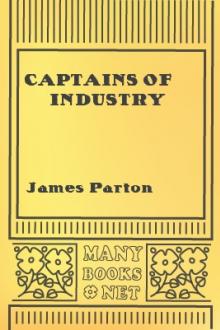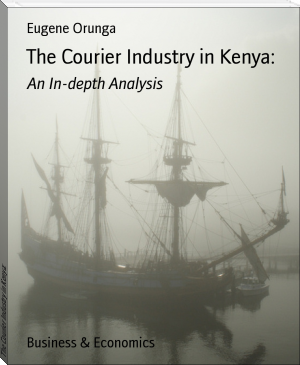Captains of Industry by James Parton (life changing books to read TXT) 📕

- Author: James Parton
- Performer: -
Book online «Captains of Industry by James Parton (life changing books to read TXT) 📕». Author James Parton
The chaplain replied to Mr. Adams:—
"President, I am well aware of the notable connection of events to which you refer; and having committed and declaimed a part of your own great oration when a schoolboy in New York, I could without effort repeat it to you now."
The aged statesman was surprised and gratified at this statement. The procession was formed and the oration successfully delivered. Since that time, I believe, an Adams of the fourth generation has spoken in the same place, and probably some readers will live to hear one of the fifth and sixth.
The venerable John Adams might well say that he had not been used to catch cold in the air of Faneuil Hall, for as far as I know there has never been held there a meeting which has not something of extraordinary warmth in its character. I have mentioned above that the first public meeting ever held in it after its completion in 1742 was to commemorate the premature death of the donor of the edifice; on which occasion Mr. John Lovell delivered a glowing eulogium.
"Let this stately edifice which bears his name," cried the orator, "witness for him what sums he expended in public munificence. This building, erected by him, at his own immense charge, for the convenience and ornament of the town, is incomparably the greatest benefaction ever yet known to our western shore."
Towards the close of his speech, the eloquent schoolmaster gave utterance to a sentiment which has often since been repeated within those walls.
"May this hall be ever sacred to the interests of truth, of justice, of loyalty, of honor, of liberty. May no private views nor party broils ever enter these walls."
Whether this wish has been fulfilled or not is a matter of opinion. General Gage doubtless thought that it had not been.
Scenes of peculiar interest took place in the Hall about the beginning of the year 1761, when the news was received in Boston that King George II. had fallen dead in his palace at Kensington, and that George III., his grandson, had been proclaimed king. It required just two months for this intelligence to cross the ocean. The first thing in order, it seems, was to celebrate the accession of the young king. He was proclaimed from the balcony of the town house; guns were fired from all the forts in the harbor; and in the afternoon a grand dinner was given in Faneuil Hall. These events occurred on the last day but one of the year 1760.
The first day of the new year, 1761, was ushered in by the solemn tolling of the church bells in the town, and the firing of minute guns on Castle Island. These mournful sounds were heard all day, even to the setting of the sun. However doleful the day may have seemed, there was more appropriateness in these signs of mourning than any man of that generation could have known; for with George II. died the indolent but salutary let-them-alone policy under which the colonies enjoyed prosperity and peace. With the accession of the new king the troubles began which ended in the disruption of the empire. George III. was the last king whose accession received official recognition in the thirteen colonies.
I have hunted in vain through my books to find some record of the dinner given in Faneuil Hall to celebrate the beginning of the new reign. It would be interesting to know how the sedate people of Boston comported themselves on a festive occasion of that character. John Adams was a young barrister then. If the after-dinner speeches were as outspoken as the political comments he entered in his Diary, the proceedings could not have been very acceptable to the royal governor. Mr. Adams was far from thinking that England had issued victorious from the late campaigns, and he thought that France was then by far the most brilliant and powerful nation in Europe.
A few days after these loyal ceremonies, Boston experienced what is now known there as a "cold snap," and it was so severe as almost to close the harbor with ice. One evening, in the midst of it, a fire broke out opposite Faneuil Hall. Such was the extremity of cold that the water forced from the engines fell upon the ground in particles of ice. The fire swept across the street and caught Faneuil Hall, the interior of which was entirely consumed, nothing remaining but the solid brick walls. It was rebuilt in just two years, and reopened in the midst of another remarkably cold time, which was signalized by another bad fire. There was so much distress among the poor that winter that a meeting was held in Faneuil Hall for their relief, Rev. Samuel Mather preaching a sermon on the occasion, and this was the first discourse delivered in it after it was rebuilt.
Seven years later the Hall was put to a very different use. A powerful fleet of twelve men-of-war, filled with troops, was coming across the ocean to apply military pressure to the friends of liberty. A convention was held in Faneuil Hall, attended by delegates from the surrounding towns, as well as by the citizens of Boston. The people were in consternation, for they feared that any attempt to land the troops would lead to violent resistance. The convention indeed requested the inhabitants to "provide themselves with firearms, that they may be prepared in case of sudden danger."
The atmosphere was extremely electric in Boston just then. The governor sent word to the convention assembled in Faneuil Hall that their meeting was "a very high offense" which only their ignorance of the law could excuse; but the plea of ignorance could no longer avail them, and he commanded them to disperse. The convention sent a reply to the governor, which he refused to receive, and they continued in session until the fleet entered the harbor.
October 2, 1768, the twelve British men-of-war were anchored in a semicircle opposite the town, with cannon loaded, and cleared for action, as though Boston were a hostile stronghold, instead of a defenseless country town of loyal and innocent fellow-citizens. Two regiments landed; one of which encamped on the Common, and the other marched to Faneuil Hall, where they were quartered for four or five weeks. With one accord the merchants and property-owners refused to let any building for the use of the troops.
Boston people to this day chuckle over the mishap of the sheriff who tried to get possession of a large warehouse through a secret aperture in the cellar wall. He did succeed in effecting an entrance, with several of his deputies. But as soon as they were inside the building, the patriots outside closed the hole; and thus, instead of getting possession of the building, the loyal officers found themselves prisoners in a dark cellar.
They were there for several hours before they could get word to the commanding officer, who released them.
The joke was consolatory to the inhabitants. It was on this occasion that Rev. Mather Byles heightened the general merriment by his celebrated jest on the British soldiers:
"The people," said he, "sent over to England to obtain a redress of grievances. The grievances have returned red-dressed."
The Hall is still used for public meetings, and the region roundabout is still an important public market.
Poor boys had a hard time of it in New England eighty years ago. Observe, now, how it fared with Chauncey Jerome,—he who founded a celebrated clock business in Connecticut, that turned out six hundred clocks a day, and sent them to foreign countries by the ship-load.
But do not run away with the idea that it was the hardship and loneliness of his boyhood that "made a man of him." On the contrary, they injured, narrowed, and saddened him. He would have been twice the man he was, and happier all his days, if he had passed an easier and a more cheerful childhood. It is not good for boys to live as he lived, and work as he worked, during the period of growth, and I am glad that fewer boys are now compelled to bear such a lot as his.
His father was a blacksmith and nailmaker, of Plymouth, Connecticut, with a houseful of hungry boys and girls; and, consequently, as soon as Chauncey could handle a hoe or tie up a bundle of grain he was kept at work on the farm; for, in those days, almost all mechanics in New England cultivated land in the summer time. The boy went to school during the three winter months, until he was ten years old; then his school-days and play-days were over forever, and his father took him into the shop to help make nails.
Even as a child he showed that power of keeping on, to which he owed his after-success. There was a great lazy boy at the district school he attended who had a load of wood to chop, which he hated to do, and this small Chauncey, eight or nine years of age, chopped the whole of it for him for one cent! Often he would chop wood for the neighbors in moonlight evenings for a few cents a load. It is evident that the quality which made him a successful man of business was not developed by hardship, for he performed these labors voluntarily. He was naturally industrious and persevering.
When he was eleven years of age his father suddenly died, and he found himself obliged to leave his happy home and find farm work as a poor hireling boy. There were few farmers then in Connecticut—nay, there were few people anywhere in the world—who knew how to treat an orphan obliged to work for his subsistence among strangers. On a Monday morning, with his little bundle of clothes in his hand, and an almost bursting heart, he bade his mother and his brothers and sisters good-by, and walked to the place which he had found for himself, on a farm a few miles from home.
He was most willing to work; but his affectionate heart was starved at his new place; and scarcely a day passed during his first year when he did not burst into tears as he worked alone in the fields, thinking of the father he had lost, and of the happy family broken up never to live together again. It was a lonely farm, and the people with whom he lived took no interest in him as a human being, but regarded him with little more consideration than one of their other working animals. They took care, however, to keep him steadily at work, early and late, hot and cold, rain and shine. Often he worked all day in the woods chopping down trees with his shoes full of snow; he never had a pair of boots till he was nearly twenty-one years of age.
Once in two weeks he had a great joy; for his master let him go to church every other Sunday. After working two weeks without seeing more than half a dozen people, it gave him a peculiar and intense delight just to sit in the church gallery and look down upon so many human beings. It was the only alleviation of his dismal lot.
Poor little lonely wretch! One day, when he was thirteen years of age, there occurred a total eclipse of the sun, a phenomenon of which he had scarcely heard, and he had





Comments (0)